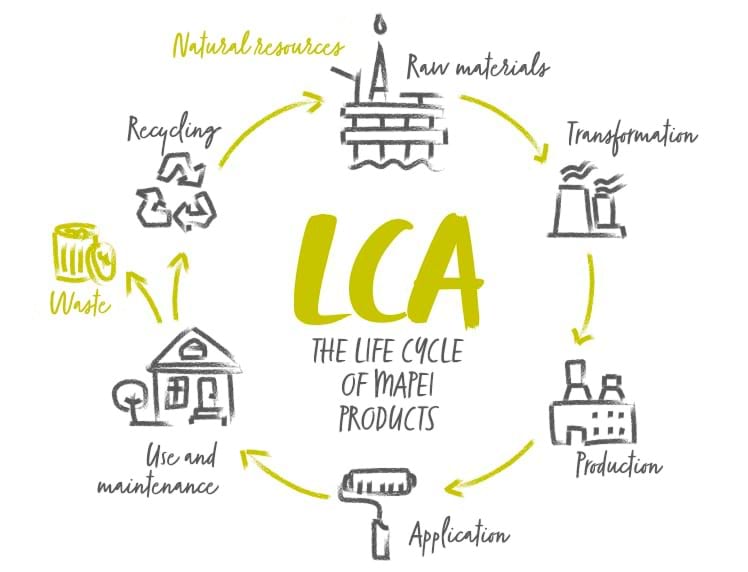 Browse by PRODUCT LINES
Browse by PRODUCT LINES
 All product lines
All product lines
 Search products
Search products
 In the spotlight
In the spotlight

With responsibility and concrete choices, we dedicate ourselves to developing products with low environmental impact, ensuring safety and durability over time. Our priority is environmental protection and user health.
We base our commitment on research, development, and the experience gained at major global construction sites. MAPEI solutions are specifically designed to reduce energy consumption and emissions of volatile organic compounds, thus promoting sustainable and quality construction.
Our aim is to promote a culture of sustainability in the construction sector.
When it comes to our company's sustainable approach, which is "People", "Planet" and "Products", MAPEI's processes focus on sustaining the environment for today and tomorrow. MAPEI is committed to providing the industry's best and most innovative solutions that are achieved through the consistent practice of following sustainable principles. This requires a sense of responsibility and the ability to make concrete choices to supply designers, contractors and customers with the long-lasting products that are reliable, are durable and have the lowest impact possible on our health and environment.

Discover the first global edition of our Sustainability Report, evidence of MAPEI's commitment to sustainability.
MAPEI promotes the total offsetting of residual CO2 emissions during the life cycle of products by acquiring certified environmental credits to support the implementation of renewable energy projects.
Since 2012 MAPEI Group has offset over 80,000 tons of CO2 associated with the manufacturing of numerous products by acquiring certified environmental credits. In 2023, CO2 emissions offset came to North America.
CO2 emissions measured throughout the life cycle of products from the Zero line over the past years, using Life Cycle Assessment (LCA) methodology, verified and certified with EPDs, have been offset through the acquisition of third-party-certified carbon credits in support of renewable energy and forestry protection projects. A commitment to the planet, to people and to biodiversity.

MAPEI offsets the CO2 residual emissions generated by all activities involved in the production of our products through reforestation projects and biodiversity conservation.
A commitment to the planet, to people and to biodiversity: Choose sustainability for all your projects, with MAPEI.


CO2 emissions from our products are expressed in kg of CO2eq per kg of product and are calculated using standardized Life Cycle Assessment (LCA) methodology. The analysis of the life cycle of a product is an evaluation of the environmental impacts the product has throughout all the various phases of its life, from cradle to grave. Calculations are made from extraction of the raw materials that make up the formula to their transport to the production plant, through the production cycle, product packaging, waste materials, transportation of the finished product to the distributor or customer and its final disposal.
The approach in which each life phase of a product is taken into consideration is called “from cradle to grave.”



Concrete is an essential material in construction. Its importance stems from its strength, durability and versatility. Globally, concrete consumption amounts to billions of tons used every year (second only to water). Ordinary Portland cement (OPC) has a high carbon footprint associated with the use of clinker-rich cements; the use of alternative cements (with reduced clinker content) leads to a reduction in carbon footprint and therefore represents a valid alternative.
In this context, MAPEI has developed the CUBE System. It is an integrated approach that helps the concrete industry overcome challenges related to the use of low-clinker cements and variable-quality aggregates through various phases: Production, transportation and installation. The CUBE System actively assists the industry in maintaining its high standards while reducing its climate impact.

Sustainability has long been the distinguishing feature of MAPEI’s operating and production systems. This is why MAPEI publishes a Sustainability Report, aimed at sharing our environmental, social and economic performance as well as our continual commitment to improvement.

Technical Services at 1-800-992-6273
Customer Service at 1-800-426-2734 (1-800-42-MAPEI)